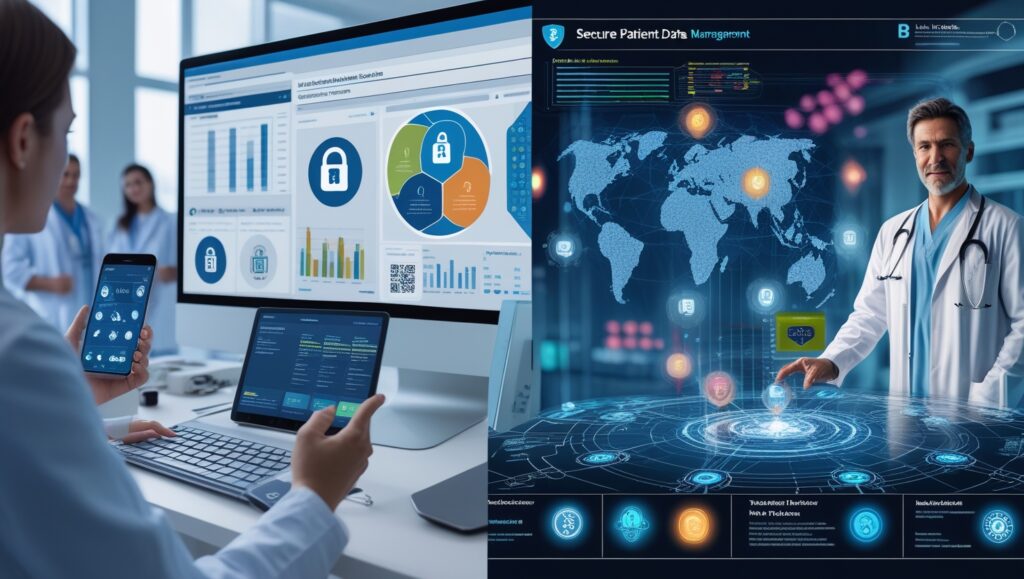How to Use Blockchain in Healthcare: Blockchain technology, once synonymous with cryptocurrencies like Bitcoin, has transcended its financial roots to become a transformative force across various industries. One of the most promising areas where blockchain is making waves is healthcare. With its ability to ensure data integrity, enhance security, and streamline processes, blockchain is poised to revolutionize how medical data is managed, shared, and protected. This article explores how blockchain can be used in healthcare, its benefits, challenges, and the future it promises.
What is Blockchain Technology?
Before diving into its applications in healthcare, it’s essential to understand what blockchain technology is. At its core, blockchain is a decentralized, distributed ledger that records transactions across multiple computers in a way that ensures the data cannot be altered retroactively. Each block in the chain contains a list of transactions, and once a block is added to the chain, it is immutable, meaning it cannot be changed or deleted.
Key features of blockchain include:
- Decentralization: No single entity controls the data.
- Transparency: All participants in the network can view the transactions.
- Security: Data is encrypted and linked to previous blocks, making it tamper-proof.
- Immutability: Once recorded, data cannot be altered.
These features make blockchain an ideal solution for industries like healthcare, where data security, privacy, and integrity are paramount.

How Blockchain Can Be Used in Healthcare
1. Secure Patient Data Management
One of the most significant challenges in healthcare is managing and protecting patient data. Traditional systems are often centralized, making them vulnerable to cyberattacks and data breaches. Blockchain offers a decentralized approach to data storage, ensuring that patient records are secure and accessible only to authorized parties.
- Electronic Health Records (EHRs): Blockchain can create a unified, tamper-proof EHR system where patient data is stored across multiple nodes. Patients can grant access to healthcare providers, ensuring seamless data sharing while maintaining privacy.
- Data Ownership: Patients can have full control over their medical data, deciding who can access it and for how long.
2. Streamlining Clinical Trials
Clinical trials are critical for developing new treatments, but they often face challenges such as data manipulation, lack of transparency, and inefficient processes. Blockchain can address these issues by:
- Ensuring Data Integrity: Trial data recorded on a blockchain is immutable, reducing the risk of fraud or errors.
- Improving Transparency: All stakeholders, including researchers, regulators, and participants, can access real-time, tamper-proof data.
- Enhancing Participant Recruitment: Blockchain can securely store and share participant data, making it easier to identify suitable candidates for trials.
3. Drug Traceability and Supply Chain Management
Counterfeit drugs are a global problem, posing significant risks to patient safety. Blockchain can enhance drug traceability by creating a transparent and immutable record of a drug’s journey from manufacturer to patient.
- Provenance Tracking: Each step in the supply chain is recorded on the blockchain, ensuring authenticity.
- Recall Management: In case of a recall, blockchain can quickly identify affected batches, minimizing risks to patients.
4. Telemedicine and Remote Patient Monitoring
The rise of telemedicine and remote patient monitoring has highlighted the need for secure data sharing. Blockchain can facilitate secure communication between patients and healthcare providers, ensuring that sensitive data is protected.
- Data Encryption: Patient data transmitted during telemedicine consultations is encrypted and stored on the blockchain.
- Interoperability: Blockchain can enable seamless data sharing between different healthcare systems, improving coordination of care.
5. Healthcare Payments and Insurance Claims
Blockchain can streamline payment processes and reduce fraud in healthcare billing and insurance claims.
- Smart Contracts: These self-executing contracts can automate claims processing, reducing administrative overhead and ensuring timely payments.
- Fraud Prevention: Blockchain’s transparency makes it easier to detect and prevent fraudulent claims.
Benefits of Blockchain in Healthcare
1. Enhanced Data Security
Blockchain’s encryption and decentralization make it nearly impossible for hackers to compromise patient data. This is particularly important in healthcare, where data breaches can have life-threatening consequences.
2. Improved Interoperability
Healthcare systems often operate in silos, making it difficult to share data. Blockchain can create a unified platform where different systems can securely exchange information.
3. Increased Transparency
Blockchain’s transparent nature ensures that all transactions are visible to authorized parties, reducing the risk of fraud and errors.
4. Cost Efficiency
By automating processes and reducing administrative overhead, blockchain can significantly lower healthcare costs.
5. Empowered Patients
Blockchain gives patients control over their data, fostering trust and engagement in their healthcare journey.
Challenges of Implementing Blockchain in Healthcare
While blockchain holds immense potential, its adoption in healthcare is not without challenges.
1. Regulatory Hurdles
Healthcare is a highly regulated industry, and integrating blockchain requires navigating complex legal and regulatory frameworks.
2. Scalability Issues
Blockchain networks can become slow and inefficient as they grow, posing challenges for large-scale healthcare applications.
3. High Implementation Costs
Developing and deploying blockchain solutions can be expensive, particularly for smaller healthcare providers.
4. Resistance to Change
The healthcare industry is often slow to adopt new technologies, and blockchain is no exception. Overcoming resistance from stakeholders is crucial for successful implementation.
5. Data Privacy Concerns
While blockchain enhances security, it also raises questions about data privacy, particularly in terms of compliance with regulations like GDPR.
The Future of Blockchain in Healthcare
Despite these challenges, the future of blockchain in healthcare looks promising. As technology evolves and stakeholders recognize its potential, we can expect to see widespread adoption. Some future trends include:
- Integration with AI and IoT: Combining blockchain with artificial intelligence (AI) and the Internet of Things (IoT) can create smarter, more efficient healthcare systems.
- Personalized Medicine: Blockchain can enable the secure sharing of genetic data, paving the way for personalized treatments.
- Global Health Initiatives: Blockchain can facilitate cross-border collaboration, improving access to healthcare in underserved regions.
Conclusion
Blockchain technology has the potential to transform healthcare by enhancing data security, improving interoperability, and streamlining processes. While challenges remain, the benefits far outweigh the drawbacks, making blockchain a key player in the future of healthcare. As the industry continues to evolve, embracing blockchain will be crucial for delivering better, safer, and more efficient care.
By leveraging blockchain, healthcare providers can not only protect patient data but also empower individuals to take control of their health. The journey toward a blockchain-powered healthcare system is just beginning, and the possibilities are endless.











